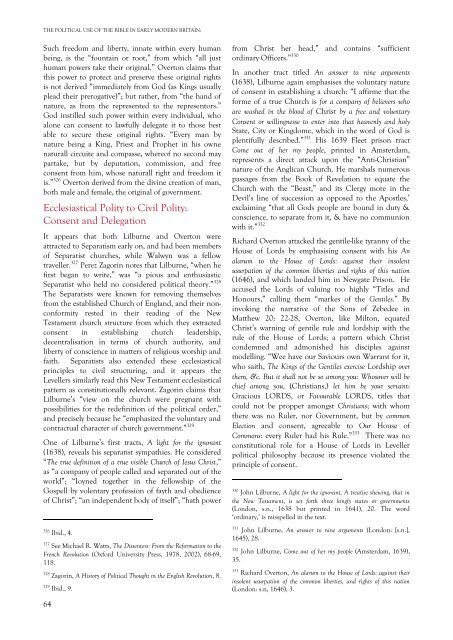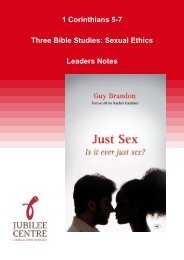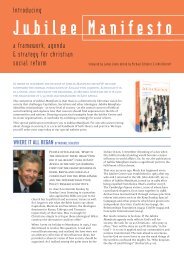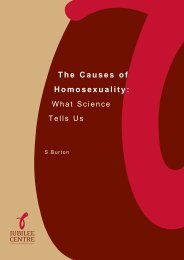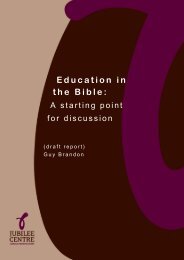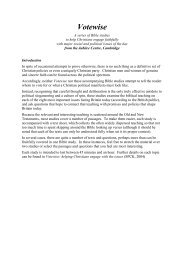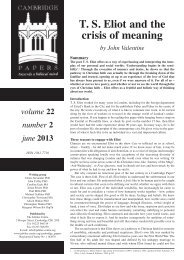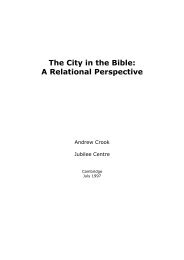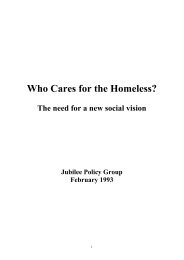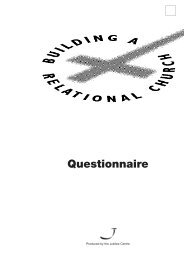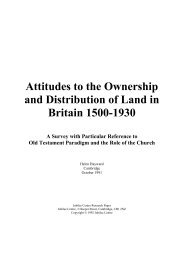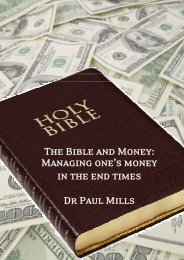Report Template - Jubilee Centre
Report Template - Jubilee Centre
Report Template - Jubilee Centre
Create successful ePaper yourself
Turn your PDF publications into a flip-book with our unique Google optimized e-Paper software.
THE POLITICAL USE OF THE BIBLE IN EARLY MODERN BRITAIN:<br />
Such freedom and liberty, innate within every human<br />
being, is the “fountain or root,” from which “all just<br />
human powers take their original.” Overton claims that<br />
this power to protect and preserve these original rights<br />
is not derived “immediately from God (as Kings usually<br />
plead their prerogative)”; but rather, from “the hand of<br />
nature, as from the represented to the representors.”<br />
God instilled such power within every individual, who<br />
alone can consent to lawfully delegate it to those best<br />
able to secure these original rights. “Every man by<br />
nature being a King, Priest and Prophet in his owne<br />
naturall circuite and compasse, whereof no second may<br />
partake, but by deputation, commission, and free<br />
consent from him, whose naturall right and freedom it<br />
is.” 326 Overton derived from the divine creation of man,<br />
both male and female, the original of government.<br />
Ecclesiastical Polity to Civil Polity:<br />
Consent and Delegation<br />
It appears that both Lilburne and Overton were<br />
attracted to Separatism early on, and had been members<br />
of Separatist churches, while Walwyn was a fellow<br />
traveller. 327 Perez Zagorin notes that Lilburne, “when he<br />
first began to write,” was “a pious and enthusiastic<br />
Separatist who held no considered political theory.” 328<br />
The Separatists were known for removing themselves<br />
from the established Church of England, and their nonconformity<br />
rested in their reading of the New<br />
Testament church structure from which they extracted<br />
consent in establishing church leadership,<br />
decentralisation in terms of church authority, and<br />
liberty of conscience in matters of religious worship and<br />
faith. Separatists also extended these ecclesiastical<br />
principles to civil structuring, and it appears the<br />
Levellers similarly read this New Testament ecclesiastical<br />
pattern as constitutionally relevant. Zagorin claims that<br />
Lilburne’s “view on the church were pregnant with<br />
possibilities for the redefinition of the political order,”<br />
and precisely because he “emphasized the voluntary and<br />
contractual character of church government.” 329<br />
One of Lilburne’s first tracts, A light for the ignorant<br />
(1638), reveals his separatist sympathies. He considered<br />
“The true definition of a true visible Church of Iesus Christ,”<br />
as “a company of people called and separated out of the<br />
world”; “Ioyned together in the fellowship of the<br />
Gospell by volentary profession of fayth and obedience<br />
of Christ”; “an independent body of itself”; “hath power<br />
326<br />
Ibid., 4.<br />
327<br />
See Michael R. Watts, The Dissenters: From the Reformation to the<br />
French Revolution (Oxford University Press, 1978, 2002), 68-69,<br />
118.<br />
328<br />
Zagorin, A History of Political Thought in the English Revolution, 8.<br />
329<br />
Ibid., 9.<br />
from Christ her head,” and contains “sufficient<br />
ordinary Officers.” 330<br />
In another tract titled An answer to nine arguments<br />
(1638), Lilburne again emphasises the voluntary nature<br />
of consent in establishing a church: “I affirme that the<br />
forme of a true Church is for a company of believers who<br />
are washed in the blood of Christ by a free and voluntary<br />
Consent or willingnesse to enter into that heavenly and holy<br />
State, City or Kingdome, which in the word of God is<br />
plentifully described.” 331 His 1639 Fleet prison tract<br />
Come out of her my people, printed in Amsterdam,<br />
represents a direct attack upon the “Anti-Christian”<br />
nature of the Anglican Church. He marshals numerous<br />
passages from the Book of Revelation to equate the<br />
Church with the “Beast,” and its Clergy more in the<br />
Devil’s line of succession as opposed to the Apostles,’<br />
exclaiming “that all Gods people are bound in duty &<br />
conscience, to separate from it, & have no communion<br />
with it.” 332<br />
Richard Overton attacked the gentile-like tyranny of the<br />
House of Lords by emphasising consent with his An<br />
alarum to the House of Lords: against their insolent<br />
usurpation of the common liberties and rights of this nation<br />
(1646), and which landed him in Newgate Prison. He<br />
accused the Lords of valuing too highly “Titles and<br />
Honours,” calling them “markes of the Gentiles.” By<br />
invoking the narrative of the Sons of Zebedee in<br />
Matthew 20: 22-28, Overton, like Milton, equated<br />
Christ’s warning of gentile rule and lordship with the<br />
rule of the House of Lords; a pattern which Christ<br />
condemned and admonished his disciples against<br />
modelling. “Wee have our Saviours own Warrant for it,<br />
who saith, The Kings of the Gentiles exercise Lordship over<br />
them, &c. But it shall not be so among you: Whosover will be<br />
chief among you, (Christians,) let him be your servant:<br />
Gracious LORDS, or Favourable LORDS, titles that<br />
could not be propper amongst Christians; with whom<br />
there was no Ruler, nor Government, but by common<br />
Election and consent, agreeable to Our House of<br />
Commons: every Ruler had his Rule.” 333 There was no<br />
constitutional role for a House of Lords in Leveller<br />
political philosophy because its presence violated the<br />
principle of consent.<br />
330<br />
John Lilburne, A light for the ignorant, A treatise shewing, that in<br />
the New Testament, is set forth three kingly states or governments<br />
(London, s.n., 1638 but printed in 1641), 20. The word<br />
‘ordinary,’ is misspelled in the text.<br />
331<br />
John Lilburne, An answer to nine arguments (London: [s.n.],<br />
1645), 28.<br />
332<br />
John Lilburne, Come out of her my people (Amsterdam, 1639),<br />
35.<br />
333<br />
Richard Overton, An alarum to the House of Lords: against their<br />
insolent usurpation of the common liberties, and rights of this nation<br />
(London: s.n, 1646), 3.<br />
64


